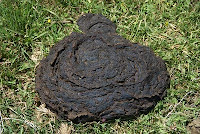 Mycobacterium vaccae is a nonpathogenic species of the Mycobacteriaceae family of bacteria that lives naturally in soil. Its name is derived from the Latin word, vacca (cow) as the first described strain was isolated from cow dung in Austria. Prof Dorothy Matthews, who led the new research, says it “suggests that Mycobacterium vaccae may play a role in anxiety and learning in mammals”, testifying to the fact that “we evolved with dirt as hunter gatherers”. In other words, cowpats fertilise minds as well as fields.
Mycobacterium vaccae is a nonpathogenic species of the Mycobacteriaceae family of bacteria that lives naturally in soil. Its name is derived from the Latin word, vacca (cow) as the first described strain was isolated from cow dung in Austria. Prof Dorothy Matthews, who led the new research, says it “suggests that Mycobacterium vaccae may play a role in anxiety and learning in mammals”, testifying to the fact that “we evolved with dirt as hunter gatherers”. In other words, cowpats fertilise minds as well as fields.Next time I am walking the dog through Larks Hill, and the cows are there maybe I will sniff the air that bit better.



No comments:
Post a Comment